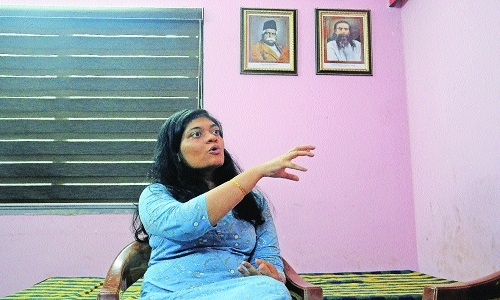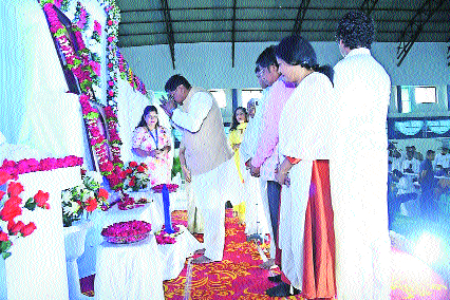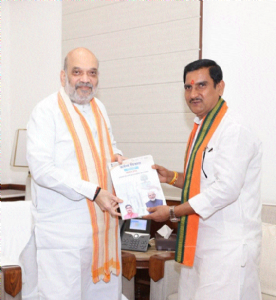Wokeism is weaponising society by inventing injustices: Samant
| Date :12-Sep-2023 |

By Kartik Lokhande :
“We must not consume tea. It was introduced by people who were foreign to our country. The true Bharatiya drink is ‘Nariyal Paani’ (coconut water).” These opening lines of casual conversation introduce Rashmi Samant as a person truly rooted in Indian culture. But, as the conversation progresses, she comes across as a young woman enthusiastic about everything happening around in the world, as an author, and as a commentator on Wokeism that has been dominating the public discourse these days. In a free-wheeling chat with ‘The Hitavada’ on Monday during her stay in the city, Rashmi Samant spoke about Wokeism, its origin, its impact on youngsters, and what could be possible solutions to this phenomenon that is targeting cultural cohesion in Western countries as well as India. According to Rashmi Samant, author of the book ‘A Hindu in Oxford’, Wokeism is a slang for being ‘awake’ to injustice. “Its origin is rooted in racial discrimination against the Blacks in Western countries. The Blacks felt that the institutions in those countries were against them. So, they called out injustice, started deciding the oppressor and the oppressed. Gradually, they started raising voice and asserting themselves economically, socially, and culturally. Woke justice was delivered by woke mobs.
Like every other great movement, this to, was hijacked by the Cultural Marxists and there lies the problem,” she explains. Samant, who made history as the first Indian female to be elected President of the Oxford University Students’ Union but was later forced to resign from the post following a controversy raked in by some people. Many of those who trolled her during that phase of life were, she says, knowingly or unknowingly ‘Wokes’. “The Cultural Marxists have hijacked Wokeism to target the pre-defined oppressors with the help of indoctrinated mobs. Particularly, they are targeting the youngsters because at young age one craves for change. Sadly, such influences have reduced the youngsters to Woke activists forcing them to stray on to the path of unrest and destruction,” she says. The Wokes have infiltrated the technical institutions through Humanities education, she adds.
To a question on how Wokeism spreads among youngsters, Samant has simple reply, “It works on peer pressure model.” Elaborating, she says that people are not allowed to ask questions. Those asking questions or seeking proof of how could one group be defined as oppressor and another as oppressed, are isolated. In such cases, guilt in individuals for not being part of a group, forces them to find ally. Besides, the accusation ‘If you are not with us, you are against us’ compels them to be part of the group. As a result of all these, the youngsters do not ask question whether or not something being propagandised or fed to them as part of Wokeism applies to Bharatiya principles of cultural cohesion. Besides, she laments, things go to such an extent that such pressured individuals try to put themselves into some or the other ‘oppressed’ category to seek some special treatment or privileges from family and society. In her experience, there are many ways such things are being used to target Bharatiya culture and values. For instance, Samant alleges, the Cultural Marxists have ‘misappropriated’ feminist movement to push own narrative and not to help women. Elaborating this point, she says that those supporting Wokeism feed the notions of not getting married as being equal to hyper-independent existence, into women. Wokes label women as ‘historically oppressed’ and men as ‘historical oppressors’, and they do not think or talk of a balanced and just narrative. As a result, the accusations by women against men are taken on face value as has happened in the case of popular Hollywood actor Johnny Depp and Amber Heard (Heard lost in the court trial).
Samant continues, Wokes ‘manufacture problems’, create identity isolations, and then suggest solutions that destroy cultures. Another example, she says, is ‘LGBTQIA+’. “They keep on inventing new genders. In the process, the intersexed persons, who are real minorities and need society’s respect and care, are losing their cause. As far as Indian culture is concerned, we have had Shikhandi in ‘Mahabharat’. Given the role of Shikhandi, it is quite clear that intersexed persons are culturally given respect in India. So, things like ‘Pride March’ etc are not needed in India. They may be right in Western countries with history of persecution of intersexed persons,” she elaborates. According to Samant, there are many examples to make it clear that Wokeism is actually weaponising society by inventing injustices and persecuting people. If one stands up and questions the pre-conceived definitions of ‘historical oppressors’, Wokes resort to ‘Cancel Culture’. “They simply use their vast network to cancel the programmes of such questioning individuals, ostracise them, make them bleed and lose financially as well as socially. Also, they produce ‘Atrocity Literature’ devoid of correctness of facts,” she points out. In fact, she adds, she too suffered a massive trolling because of her identity as a Hindu when she was President of Oxford University Students’ Union.
But, Samant is not a woman who is entangled into problems. She has simple suggestions to make as part of solution to counter Wokeism. “Bharatiya civilisational perspective need to be understood with proper study. Such a study needs to be encouraged at home, at institutions, and in society. Such a study must be amplified. Unity of people to maintain cultural cohesion in India, amplifying historic and cultural values into popular discussion, and reading, understanding terminologies, deeper thinking, researching to know facts, scrutiny of allegations planted by Wokes... all these things and a balanced thinking aiming at change through constructive ways hold the solution to Wokeism,” she concludes. The conversation with ‘The Hitavada’ comes to an end, but her discussion does not stop at it. She moves on to the next guest waiting to meet her and benefit from understanding challenges confronting the Indian society. And, the saga of Rashmi Samant continues...







